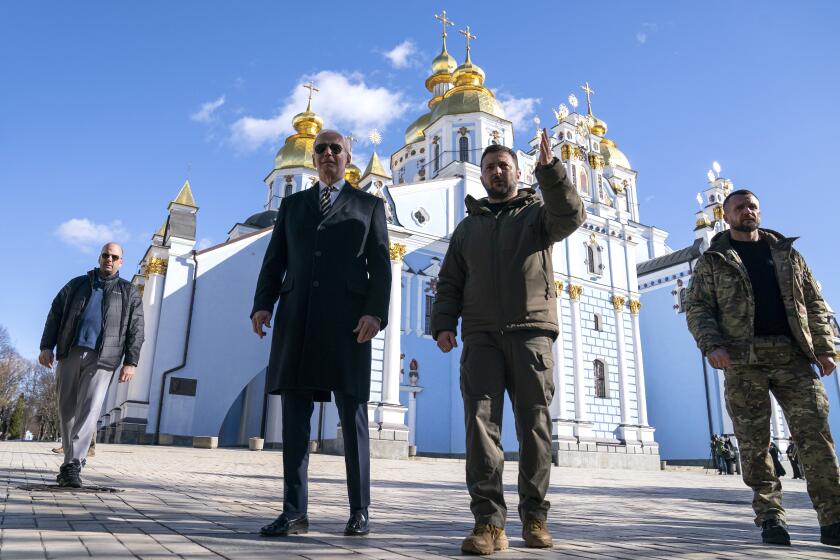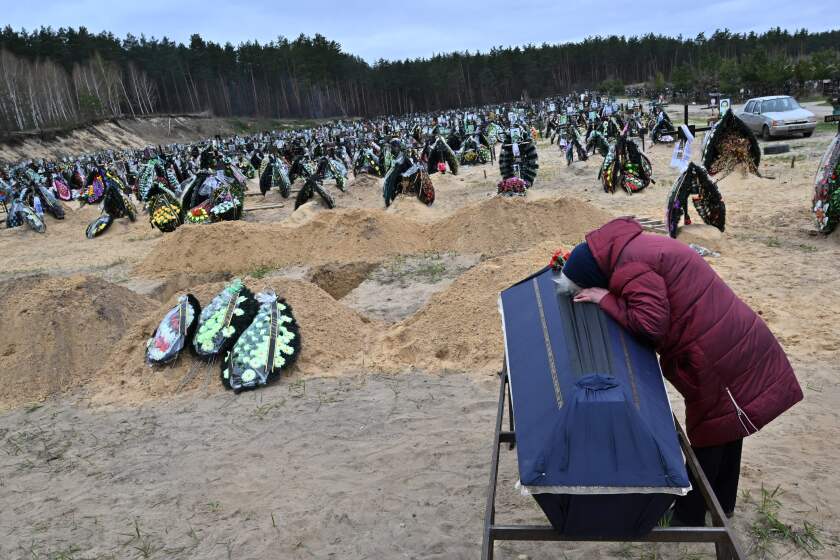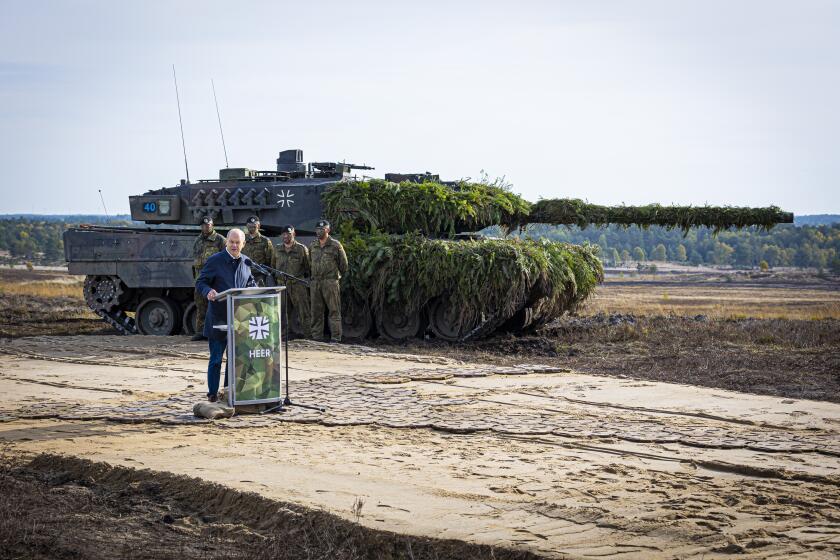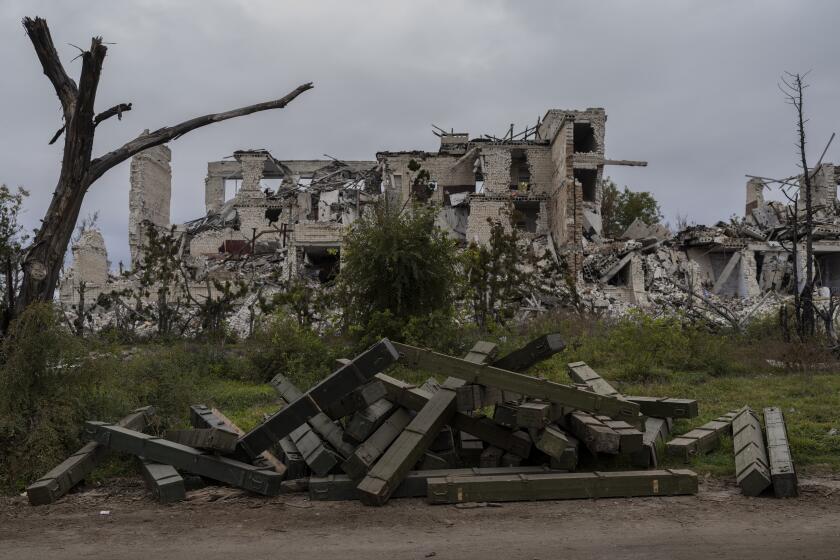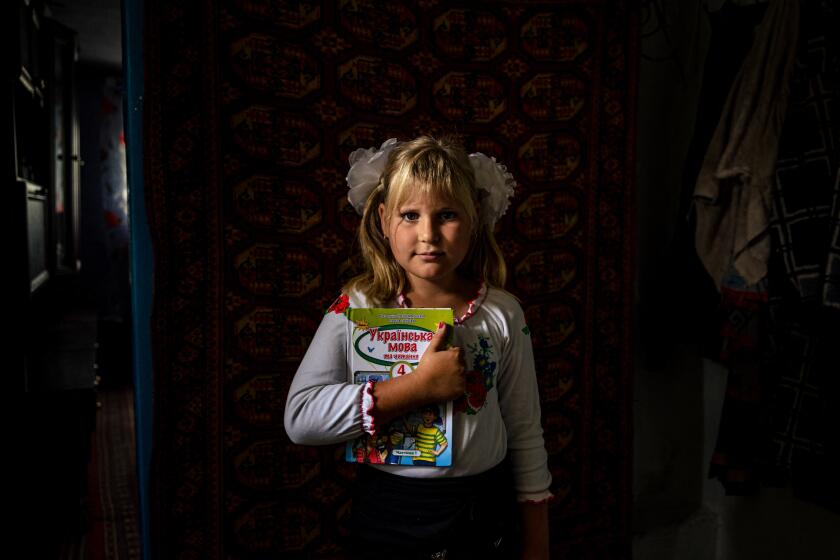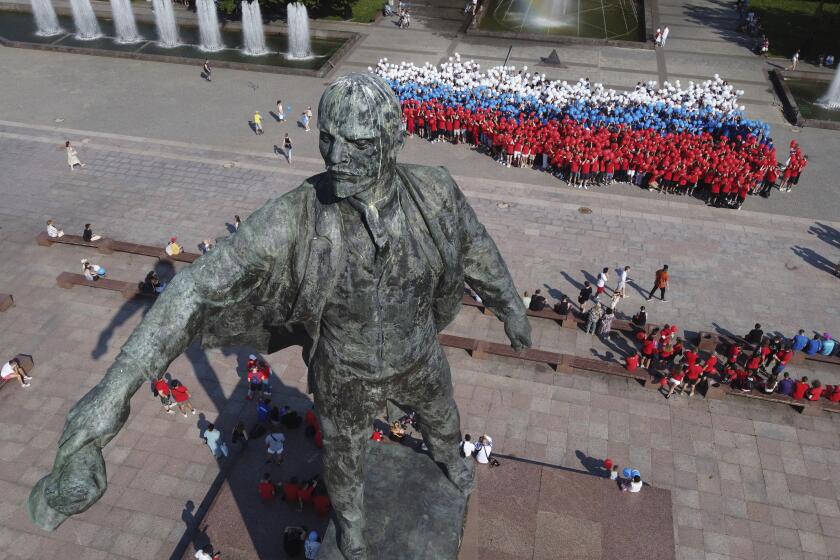Opinion: What the world learned about Ukraine in a year of war
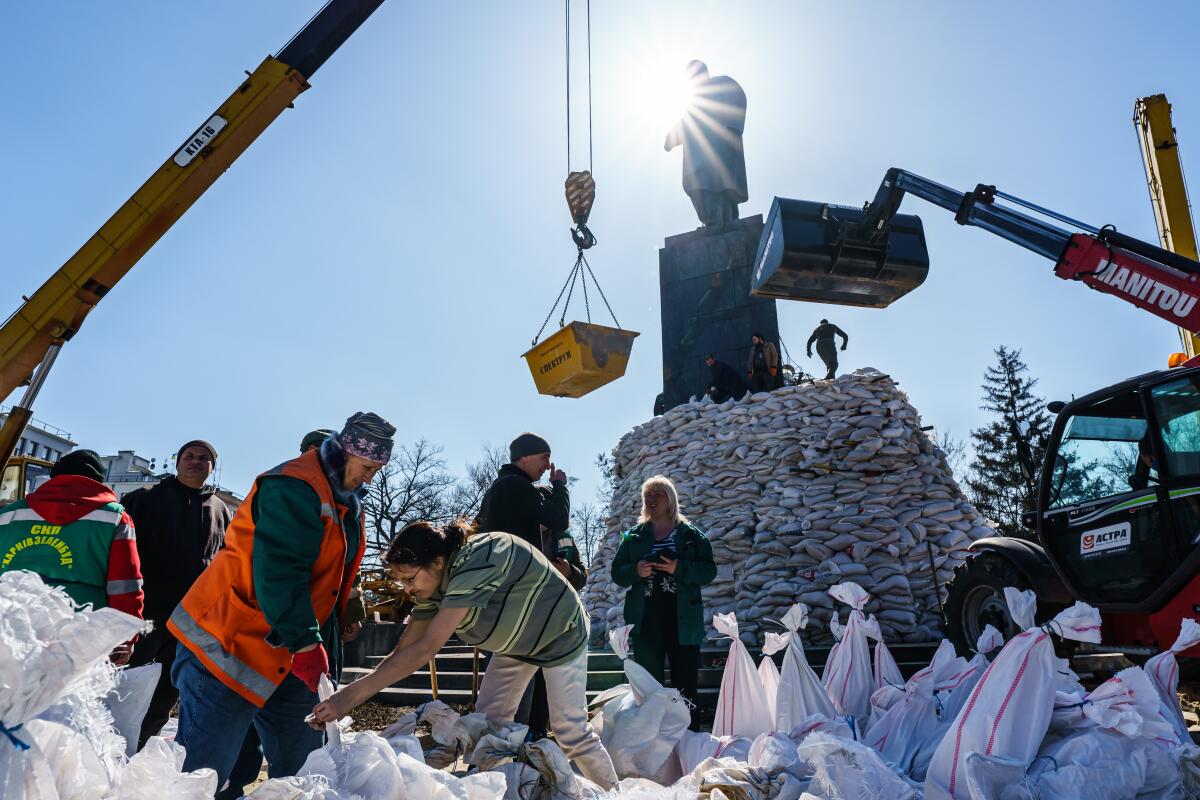
- Share via
Russia’s invasion of Ukraine is a war of conquest. Conquest of territory that the Kremlin feels entitled to; of people, who according to Putin belong to the “Russian World”; and of resources, from machinery and grain looted by the Russian state to washing machines, electronics devices and personal items pilfered by Russian soldiers. But above all, the war is about Russia gaining control over Ukrainian identity and history.
In 2014, just 1 out of 6 Americans could point Ukraine out on a map. In 2022, on the eve of Russia’s attack, only 34% of Americans could tell where Ukraine was. A year later, most people know about the country, and small Ukrainian towns such as Bucha or Bakhmut have become household names throughout the West.
Sadly, the cause of this recognition is destruction and suffering, but the longer-term effects of global awareness will ensure that people the world over recognize and appreciate Ukraine as an independent state, not an appendage of Russia.
This trip signals a shift for the U.S., as the Biden administration will no longer be wary of arming Ukraine to turn back Russia’s invasion.
According to Vladimir Putin’s deeply held views, Ukraine is an aberration, a historical fiction that emerged out of a fatal mistake committed by Lenin and the Communist Party. Russians and Ukrainians, in Putin’s own words, are one people — a single whole.
Putin’s claim is a continuation of a long-standing tradition of Russian historiography, nationalist thinking and official policy that views Great Russians, Little Russians (that is, Ukrainians) and White Russians (Belorussians) as different branches of a single ancient Russian people that originated in the medieval Kievan Rus state.
To ensure that Ukrainians remain nothing more than Russians’ little brothers, the Russian Empire and later the Soviet Union engaged in a determined campaign to suppress and, at times, physically eliminate Ukrainian cultural figures, political elites and intellectuals and even the Ukrainian language itself.
As post-Soviet immigrants in the U.S., we were once united, but deep rifts have emerged since Russia’s invasion of Ukraine a year ago.
Short periods of relative openness in the 1920s and 1960s allowed Ukrainian culture and language to flourish, but repression inevitably returned and erased most of the progress made. In this current war, Putin follows the policies of his imperial and Soviet predecessors. Since the beginning of the invasion, Russians are targeting and looting Ukraine’s museums, destroying monuments, murdering cultural figures and erasing Ukraine from the school curriculum both in the occupied Ukrainian territories and at home. In areas under Russian control, simply speaking Ukrainian might be enough to get arrested and tortured.
Russia’s war is inflicting untold damage on Ukraine’s culture, monuments and historical sites. But, in contrast to Putin’s goals, the war has also strengthened Ukrainian identity and caused many people worldwide to discover and appreciate Ukraine and its diverse multicultural history. A year of brutal war, heroic resistance and genocide shattered the Kremlin’s narrative that Russians and Ukrainians are the same.
The war also spurred the growth of the Ukrainian language, the traditional target of Russia’s attempts to suppress Ukraine’s independence. In Ukraine, Russian speakers whom the Kremlin propaganda ostensibly seeks to liberate increasingly abandon the language of the invader and switch to Ukrainian. Worldwide, the number of people interested in learning Ukrainian has skyrocketed. The language learning app Duolingo found that over the last year, 1.3 million people began learning Ukrainian on that platform alone, with Germany and Poland registering a whopping 1,600% increase in Ukrainian learners.
As the war approaches the one-year mark, the Biden administration should still proceed with caution in deciding what level of weaponry to provide Ukraine in 2023.
The vibrant Ukrainian culture has also received increased recognition from both award committees and the public. In 2022, Serhiy Zhadan, a Ukrainian writer and poet whose masterpiece novel “The Orphanage” centers on the early stages of Russian-Ukrainian conflict in 2014, won two prestigious literary prizes, including the German Peace Prize. “Stefania,” a song combining rap music with traditional western Ukrainian instruments and costumes, triumphed at the Eurovision contest.
These achievements should not be seen as mere signs of wartime solidarity; Ukrainian performers have won Eurovision contests in the past and Ukrainian writers can boast of literature awards prior to 2022. What changed is not the Ukrainians’ talent and creativity but the international awareness of and interest in Ukrainian culture.
Russia’s invasion, which explicitly utilized the Romanov dynasty’s symbols, language and aspirations, also led to a growing global recognition of Russia’s colonial past and the lack of domestic reckoning with this troubled history. As scholars grapple with calls to decolonize the research and teaching on Eurasia, the West finally accepted that Russia does not have a monopoly on the history and culture of regions it controlled in the past.
The Kremlin would capitalize on a premature cease-fire to prepare for further attacks. And it wouldn’t pay for the damage it caused.
Thus, the New York’s Metropolitan Museum of Art recently changed its description of artists born in the territory of Ukraine from Russians to Ukrainians. As the awareness of Ukraine and its history continues to grow, more of Ukraine’s historical heritage will be recognized and reclaimed.
Ukraine is the heart of a region that the historian Timothy Snyder describes as bloodlands, territories which are located between Russia and Germany and thus became the epicenter of both Hitler’s and Stalin’s atrocities before and during World War II. The Kremlin’s violence, however, has been overshadowed by the Holocaust, the most horrific and best known of mass murders.
Putin’s invasion of Ukraine has made the world more aware of past suffering inflicted by Russia on Ukraine and its different communities — ethnic Ukrainians, Crimean Tatars, Jews, Poles and others. This is most pronounced with the Holodomor, the Soviet man-made famine of 1932-33 in which millions perished. While Ukraine views the Holodomor as genocide, other countries were previously more reluctant to use this label. In 2022, the European Parliament and national parliaments, including those of Germany, the Czech Republic and Brazil, recognized the famine as genocide.
Putin seeks to erase Ukrainian identity. Replacing the Russian language with their own, Ukrainians are fighting back.
Highlighting and publicizing Ukraine’s history abroad is not without challenges. The growing awareness of Ukraine’s complex past also inevitably involves painful conversations about the darker events, most notably the World War II-era violence and terrorism perpetrated by the Organization of Ukrainian Nationalists (OUN) and the Ukrainian Insurgent Army (UPA). While many in Ukraine celebrate these organizations and their leader Stepan Bandera as fighters for national independence, others, including Germany, Israel and Poland, Ukraine’s closest ally, see these events differently.
Bandera and his followers certainly fought against Moscow and for an independent Ukraine, but the Ukrainian state they originally envisioned was to be authoritarian, illiberal and with no protections for minorities. Had Bandera been alive, he would have undoubtedly been horrified by the idea of Ukraine led by the ethnically Jewish President Volodymyr Zelensky. Ukrainian extreme nationalists were active in anti-Jewish violence during the Holocaust, and the UPA’s war against the Poles turned into a campaign of ethnic cleansing, which many in Poland consider a genocide.
Losing the war in Ukraine is the best hope for Russia to get back on the path to economic and social stability.
Yet this debate is fully necessary, foremost for Ukraine itself. As the world discovers Ukraine, the crucial question is which Ukraine will emerge out of this brutal war.
Ukrainians have already shown that Russia and Ukraine are not the same, but the struggle to build a democratic, liberal and inclusive Ukraine is still on. Those who, over the last year, learned to appreciate Ukraine, its culture and history can become important allies in this endeavor.
Eugene Finkel, an associate professor of international affairs at Johns Hopkins University, is the author of the forthcoming book “To Kill Ukraine.” @eugene_finkel
More to Read
A cure for the common opinion
Get thought-provoking perspectives with our weekly newsletter.
You may occasionally receive promotional content from the Los Angeles Times.
